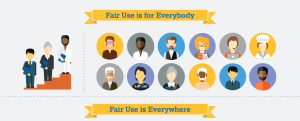 Let’s celebrate fair use and (especially in Canada) fair dealing! These exceptions to copyright monopolies are critically important tools for all creators.
Let’s celebrate fair use and (especially in Canada) fair dealing! These exceptions to copyright monopolies are critically important tools for all creators.
Why celebrate?
Fair use, the right to reuse copyrighted material without permission or payment under some circumstances, is a robust and critically important tool for all creators. Copyright gives the copyright holder the right to privately censor any use of their work for any reason. Exceptions like fair use (and in Canada, fair dealing) repeal that censorship ability—generally, if you are reusing that copyrighted work for a different purpose than its market, and in appropriate amounts to your new purpose.
The Association of Research Libraries (ARL) hosts Fair Use/Fair Dealing Week every year around this time, and it’s both a chance to refresh our knowledge and also celebrate new achievements. Scholars and librarians throughout North America pour out insights throughout the week; catch the 2022 posts, all collected here.
Journalists, Artists, Filmmakers, Myths and More!
ARL’s Katherine Klosek was kind enough to interview me for the ARL blog, on several topics. For instance:
- Fair use and journalists: Journalists employ fair use every day, mostly without thinking about it. But when they do think about it, sometimes they have doubts. The Set of Principles in Fair Use for Journalism can dispel them. Need more? Here’s a quick take from my interview.
- Fair use and arts professionals: Art historians need to quote artworks to write their books and scholarly articles; artists make collages of copyrighted work; museums provide electronic exhibits. Too often they don’t know their fair use rights. Fortunately the College Art Association now has a Code of Best Practices in Fair Use for the Visual Arts, to take the mystery out of their choices. Need more? Here’s a bite from my talk with Katherine about fair use and arts professionals.
- Is fair use just a defense? Sometimes people discount fair use as “just a defense.” But it’s actually a user’s right, just as robust as your other rights. Still wondering? Here’s an explanation from my chat with Katherine that might help.
- Documentarians, wearing it with pride: Documentary filmmakers were the first professional group to create a fair use code, their Documentary Filmmakers Statement of Best Practices in Fair Use. How has it worked out? Very, very, very, very well. More here.
- Myths of fair use: The Internet is littered with terrible advice on fair use. If you ever heard a number associated with assessing your fair use rights, that’s a myth. Here’s a friendly set of tips on how to avoid the myths and stay safely within your fair use rights.

Thank you Katherine Klosek and the Association of Research Libraries for letting me tell so much good news!
